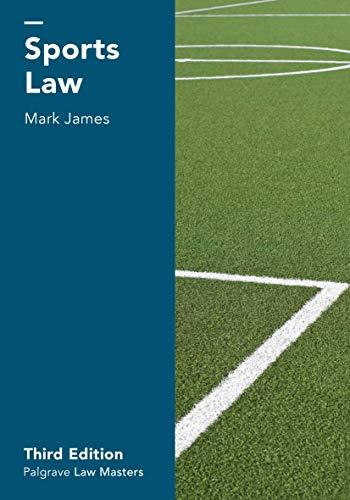Question
After reading the articles below, what legal concepts would you need to take into consideration if you were a Christian coach at a public high
After reading the articles below, what legal concepts would you need to take into consideration if you were a Christian coach at a public high school and were thinking of having a team prayer or devotional?How could you incorporate your faith in a vocational setting that regulates a person's expression of their beliefs?
Consider the cheerleaders: Religious expression
Abstract
The problem is that the Lions have, perhaps, posted these gains after making illicit use of performance-enhancing prayer. Since the start of the year the school's cheerleading squad has been displaying banners painted with Bible verses (like the one pictured above).
Full Text
Translate
Should a public school's cheerleading squad be allowed to display banners painted with Bible verses?
THE Kountze Lions, a high-school football team from east Texas, are having a good season. Their all-time win percentage is 38%. Thus far this year, they're five for seven. The problem is that the Lions have, perhaps, posted these gains after making illicit use of performance-enhancing prayer. Since the start of the year the school's cheerleading squad has been displaying banners painted with Bible verses (like the one pictured above). It's common at high-school football games for the team to run onto the field by bursting through such banners like the Kool-Aid man, but it's not common for the banners to carry religious messages, because public schools aren't supposed to promote religion. Last month, accordingly, the district's superintendent banned such banners, but on October 18th a district court ruled that the school can't enforce the ban for the time being.
At a press conference in support of the cheerleaders last week Rick Perry, the governor, and Greg Abbott, the state's attorney-general, were looking like Christmas, and I do mean Christmas, had come early. America's constitution separates church and state, as indeed does the Texas version. But Texas's contemporary political leaders have notably declined to give the principle much respect. The controversy had given them a chance to stand up for Texas, high-school football, cheerleaders, God, and the constitutionally enshrined right to free expression, all in one go, against the interference of--as Mr Abbott put it, in an incredulous tone--"an atheist group from Wisconsin".
The speech rights of students are often debated, because if a student is in public school, as most American students are, a lot of their self-expression happens under the auspices of a governmental entity. Broadly speaking, it's probably constitutionally correct to say that students have the right to put Bible verses on banners, just like all Americans do. And if the complaint is that an outside observer would assume that any student doing so is working under the auspices of school authority, Mr Abbott and Mr Perry would probably still be on firm footing. The exercise of rights shouldn't be curtailed simply because of other people's perceptions and preferences.
A wrinkle here, though, is that courts have already taken the position that cheerleaders are representatives of the school, even agents of the school's authority. Ian Millhiser, at ThinkProgress, notes that this point was considered legally relevant in another recent case in Texas: in 2010 a cheerleader in Silsbee was kicked off the squad after refusing to cheer for one of the players. The girl had accused the boy of raping her; he later pled guilty to simple assault. She sued the school, arguing that by kicking her off the squad, it had violated her rights to free expression. The Fifth Circuit court ruled against her, and its reasoning was that as a cheerleader, she was supposed to speak on behalf of the school, not on behalf of herself. A less directly relevant example, which nevertheless suggests that cheerleading is serious business, would be the case of Crystal City, where the high school's discriminatory policy against Mexican-American girls who wanted to be cheerleaders led to several years of protests, starting in 1969, on behalf of Chicano rights. (One of the young activists who organised those protests, JosE Angel GutiErrez, would go on to co-found and lead La Raza Unida.)
In other words, courts have held, and Texans believe, that cheerleaders are a special subset of students, and not just for the reasons dramatised in John Hughes movies and Taylor Swift songs. They're not people who happen to be standing on the football field, exercising their right to free speech. They're deputies of the school administration; they speak for the school, not themselves. That was the point of the Fifth Circuit's ruling, anyway. So which is it? Do cheerleaders speak as themselves or not?
It's unsurprising but significant that Mr Perry and Mr Abbott would argue otherwise. Neither of them can get through a press conference lately, including the aforementioned one, without deflecting a question about whether he's running for governor in 2014. Mr Abbott is also a Republican, and might be willing to challenge Mr Perry in the primary; a widespread opinion among Texas politicos is that should Mr Perry stand for another term, Mr Abbott has a better shot of beating him than anyone else, in the primary or the general. Polls have shown that a large majority of Texas voters support the separation of church and state, and everyone knows that the state's changing demographics could mean trouble for Texas Republicans. But if Texas's leadership is going to continue to dabble in the culture wars, it's a solid sign that the shift isn't afoot just yet.
Word count:796
(Copyright 2012 The Economist Newspaper Ltd. All rights reserved.)
Step by Step Solution
There are 3 Steps involved in it
Step: 1

Get Instant Access to Expert-Tailored Solutions
See step-by-step solutions with expert insights and AI powered tools for academic success
Step: 2

Step: 3

Ace Your Homework with AI
Get the answers you need in no time with our AI-driven, step-by-step assistance
Get Started


